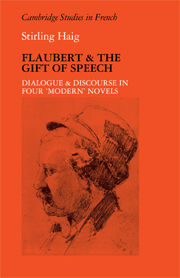Summary
Our words are giants when they do us an injury, and dwarfs when they do us a service.
(Wilkie Collins, The Woman in White)As I have already suggested in the preceding chapters, speech puts the Flaubertian character at considerable risk – there seems to be no better or immediate means to expose bêtise than to allow the protagonists to speak for themselves. Dialogue thus dramatizes narratorial irony and relieves the artist of the temptation to intervene. This “abstentionism,” as it has often been remarked, had become Flaubert's esthetic creed during the Bovary years. His letters to Louise Colet return again and again to the superior, almost divine vantage point that the author must attain in order to achieve a distance that Flaubert identified with impartiality. “Nul lyrisme, pas de réflexions, personnalité de l'auteur absente” (31 January 1852). “Je veux qu'il n'y ait pas dans mon livre un seul mouvement, ni une seule réflexion de l'auteur” (8 February 1852). “Tu m'as dit… un mot qui m'a fait bien plaisir. A savoir que tu t'apercevais qu'il n'y avait rien de plus faible que de mettre en art ses sentiments personnels … L'artiste doit s'arranger de façon à faire croire à la postérité qu'il n'a pas vécu” (27 March 1852). And in the same letter, “L'art, comme [Dieu] dans l'espace, doit rester suspendu dans l'infini, complet en lui-même, indépendant de son producteur.”
- Type
- Chapter
- Information
- Flaubert and the Gift of SpeechDialogue and Discourse in Four "Modern" Novels, pp. 53 - 106Publisher: Cambridge University PressPrint publication year: 1986

